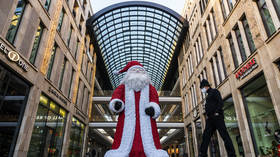‘Superspreading events under Christmas trees’: Germany urged to walk back planned easing of Covid-19 rules for holiday season

Local officials and experts in Germany are asking to reconsider plans to relax some Covid-19 restrictions during Christmas and New Year’s Eve as hotspots continue to appear across the country.
“The current system alone is not enough. The number [of cases] remains stable, there are new infections every day, and the number of deaths is increasing,” the head of Bavaria, Markus Soeder, told public broadcaster ARD.
We have to act – better sooner than later… Every four minutes someone in Germany dies from the coronavirus. We simply cannot accept that.
Soeder called for an urgent meeting of the heads of all German states with Chancellor Angela Merkel before Christmas. The next such summit is currently scheduled for January 4.
Germany most recently extended its partial lockdown until January 10. At the same time, the restrictions have been slightly relaxed for the Christmas season and New Year’s Eve. More people will be allowed to celebrate together between December 23 and January 1, and churches will be permitted to conduct festive services at limited capacity.
However, Bavaria announced more restrictions, including 9pm curfews in hotspots, that will take effect on Wednesday. Other officials are now talking about following suit. The top official in Thuringia, Bodo Ramelow, told local media there will be “no easing” of restrictions during the holiday season, while the head of Hesse, Volker Bouffier, said curfews are “necessary” in specific hotspots.
Also on rt.com German hospitals packed to the brim with 40% more Covid-19 patients in ICUs than during 1st wave – union chiefLeipzig Mayor and the head of the Association of German Cities, Burkhard Jung, said that “a stronger lockdown for a few more weeks” will be needed if the number of cases continues to grow in certain areas.
“In Germany as a whole, we have to talk about whether the planned easing [of restrictions] for Christmas and New Year’s Eve is actually correct,” Gerd Landsberg, the Chief Executive of the German Association of Towns and Municipalities (DStGB), told the Rheinische Post newspaper.
The head of Merkel’s office, Helge Braun, acknowledged that more restrictions may be required at least in specific hotspots across the country, and said the government would react quickly “if there is willingness from federal states.”
Federal Health Minister Jens Spahn voiced the same sentiment. “We are currently talking a lot about how we celebrate Christmas. These people will not celebrate Christmas any longer,” Spahn told RTL, referring to the people who died from Covid-19.
Also on rt.com Spain unveils festive travel ban & Covid curfews, but allows groups of 10 to gather for Christmas and New YearOn Monday, the Robert Koch Institute reported 12,332 new cases in Germany and 147 more deaths. Maria Barbarossa, a mathematician at the Frankfurt Institute for Advanced Studies (FIAS), told Der Spiegel magazine that any relaxation of the measures against Covid-19 “could lead to another wave.”
“The more contacts we allow, the easier the virus can spread,” Barbarossa said, explaining that in the best-case scenario the effect will be similar to school holidays, and “maybe, nothing much will happen.”
However, in the worst-case scenario, “there could be a lot of new superspreading events under Christmas trees,” the researcher warned.
“Then, the pandemic would have a whole new dynamic in January, comparable to what had happened in March after the skiing trips and after the summer vacations. Except this time the virus would not originate so much from hotspots abroad as from the hotspots at home.”
Think your friends would be interested? Share this story!













